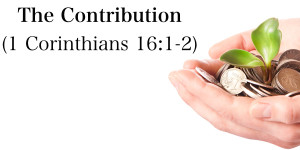Christians give of their means every first day of the week. The Bible passage that says the most about the contribution is 1 Corinthians 16:1-2. We frequently read this passage as preparatory to our giving. We must make sure we understand it.
Now concerning the collection for the saints: as I directed the churches of Galatia, so you also are to do. On the first day of every week, each of you is to put something aside and store it up, as he may prosper, so that there will be no collecting when I come.
Wendell Winkler notices the following important lessons from this text:
- Paul ordered or directed the giving. Christian giving was not merely a suggestion. He commanded it. The Greek word for “directed” is translated strongly: “Command” or “charge” in Matthew 11:1; “appoint” in Acts 20:13; Acts 7:44; “ordain” or “rule” in 1 Corinthians 7:17; “set in order” in 1 Corinthians 11:34. Obviously, the contribution was not optional.
- The giving was to take place on the first day of every week. Every week is the best translation, and is so rendered in the New American Standard Bible and various other translations. The Christians had an obligation to give every week, just as they had an obligation to take the Lord’s Supper every week (1 Corinthians 11:26).
- Each Christian was to give. It was not just for the rich or for those who had no demands on their money. No Christian was to say “Let somebody else give.”
- The Christians gave according to their prospering. Giving was to be proportional to income, and so those who made more money generally would be able to give more. This passage implies that giving needs to be liberal, as do other passages. Every biblical example of approved giving is liberal (e.g., Exodus 36:2-7; Proverbs 11:25; Malachi 3:10; Luke 21:1-4; Romans 12:8, 15:25-27; 2 Corinthians 8:1-7, 9:6-13). Under the Old Testament the Hebrews gave at least 10 percent. Given that Christianity is superior to Judaism, it is difficult to see how that Christians in the first century, many of whom were Jews, would expect to give less than 10 percent (see Hebrews 7:1-10; Luke 12:48).
- The money given by the Christians went into a common treasury. The word translated “store it up” means to “lay up, store up, gather, save,” or “reserve” (Bauer, et al.).
May God bless us in our giving, and bless our funds to accomplish His purposes. To hear Brother Winkler’s full audio lesson on giving, go here: http://bit.ly/1IvsVjg.

